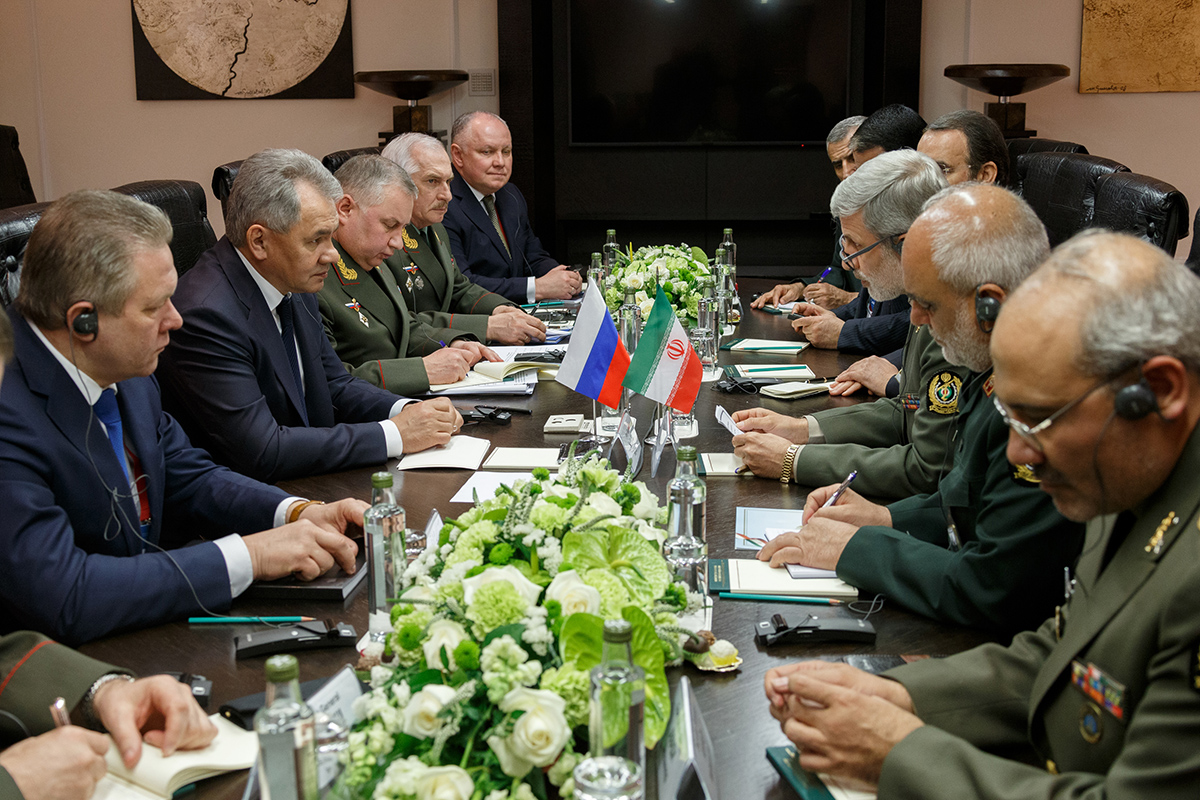The Iranian and Russian defense ministers have vowed to expand defense cooperation.
“Defense and security interactions between Islamic Republic of Iran and Russia are growing under the auspices of leaders of the two countries,” Iran’s Minister of Defense Brigadier General Amir Hatami said in a meeting with his Russian counterpart, Army General Sergey Shoygu, on April 24, on the sidelines of the eighth Moscow Conference on International Security.
From April 23-25, more than 1,000 delegates from 111 countries and seven international organizations were gathered in Moscow to exchange views on current military dangers and threats, including the improvement of the arms control system, and geopolitical situations in the Middle East, Asia, Africa and Latin America.
Both Amir Hatami and Sergey Shoygu were upbeat about the current state of Russo-Iranian defense relations, and the possibilities that lie ahead.
“Cooperation and interaction of the two countries played an important role within the framework of Astana Peace Talks in the fight against terrorism and restoration of peace and security in Syria,” the Russian defense minister said, according to TASS.
Upon arriving in Moscow last week, the Iranian defense minister warned about what Tehran perceives as risks that Donald Trump's policies pose to global security, saying "the world today is encountering numerous security issues, the most important of which may be Trumpism.”
He compared “Trumpism” with “Nazism,” saying that they include similar traits such as "selfishness, oppression and trampling on international laws and humane principles,” the Islamic Republic News Agency (IRNA) reported Hatami as saying.
His comments came the same day the Iranian parliament approved a bill that labels all United States military forces as terrorists, just a day after Washington put pressure on Tehran by announcing that no country that imports Iranian oil would be exempt from U.S. sanctions. In 2018, the Trump administration introduced sanctions against the country's banking and oil sectors after having pulled the U.S. out from the Joint Comprehensive Plan of Action, better known as the nuclear deal.
In Syria, both Russia and Iran are interested in stopping U.S. influence. The level of cooperation between Tehran and Moscow there has become a symbol aligning geopolitics. Although both have supported the Syrian President Bashar al-Assad, tensions have been rising in government-controlled territories over administrative issues as forces compete for influence.
Iran’s influence, especially, has been growing in Syria. On April 14, Iranian officials announced the resumption of a plan for a railway line from Tehran through neighboring Iraq to Damascus. The Syrian government also announced earlier this month intentions to lease the port of Latakia to Iran from October, in response to an official request. In January the two countries signed a deal to ease bank transfers to make finance for investment available faster.
However, some speculate that Russia holds significant sway over Damascus, as many proposed agreements with Iran have not actually been implemented.
Last year, Russia signed a deal with Syria that granted it exclusive rights to produce oil and gas in Syria. Although the damage to the country’s petroleum infrastructure is significant, Russia has committed to rebuild power plants, pump gas and construct mills over the next 25 years.







 Azerbaijan and Armenia started the process of demarcation of their border on Tuesday, with the installation of the first border markers based on ge...
Azerbaijan and Armenia started the process of demarcation of their border on Tuesday, with the installation of the first border markers based on ge...
 Armenian sappers commenced on Monday mine-clearance operations in the territories adjacent to the Saint Mary Church in village of Voskepar (Armenia...
Armenian sappers commenced on Monday mine-clearance operations in the territories adjacent to the Saint Mary Church in village of Voskepar (Armenia...
 Iran has refuted reports of alleged damage to Shimon Peres Negev Nuclear Research Centre located southeast of Dimona, Israel, during the recent air...
Iran has refuted reports of alleged damage to Shimon Peres Negev Nuclear Research Centre located southeast of Dimona, Israel, during the recent air...
 Iran’s Foreign Minister, Hossein Amir-Abdollahian, has labeled a foiled Israeli drone attack in certain parts of the country as a "failure" for Isr...
Iran’s Foreign Minister, Hossein Amir-Abdollahian, has labeled a foiled Israeli drone attack in certain parts of the country as a "failure" for Isr...



